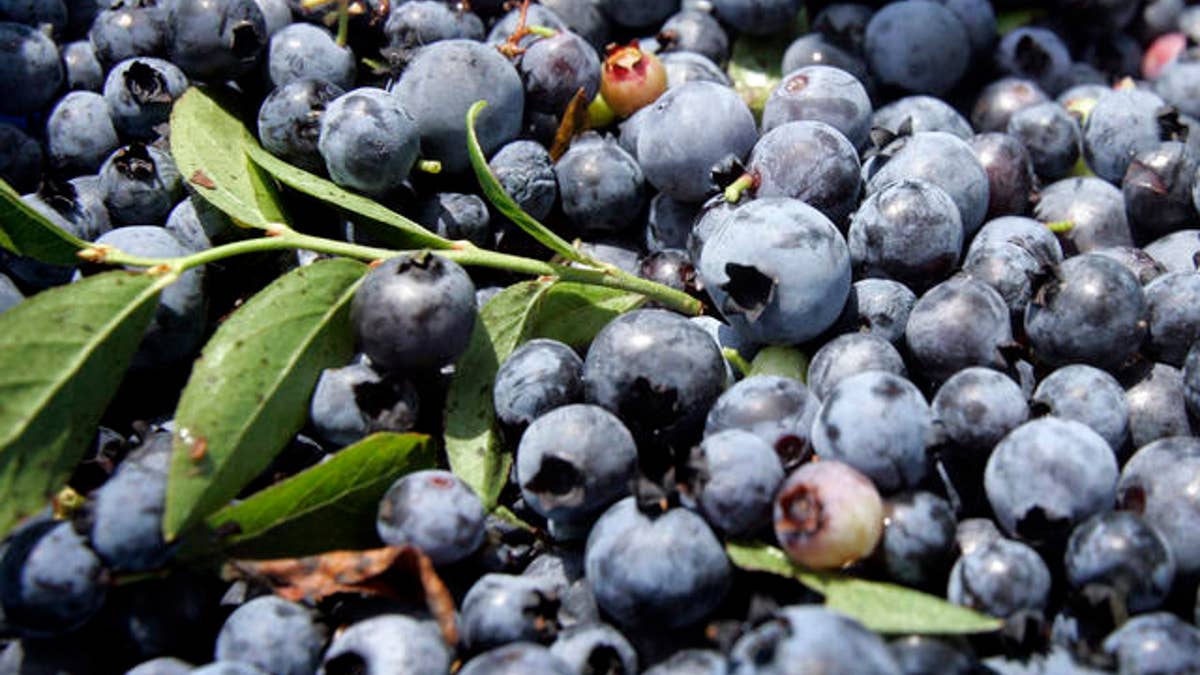
Blueberries are seen Tuesday, Aug. 7, 2007, in Union, Maine. A decade ago, about 20 percent of Maine's 60,000 acres of blueberry fields were harvested by mechanical means. Today, it's about 80 percent as growers discover that it's cheaper to replace hand pickers with more efficient machinery. (AP Photo/Robert F. Bukaty) (AP)
January: The month where mentally debilitating seasonal depression collides with physically debilitating temperatures. But if the dark days and cold nights aren’t enough of a downer, remember that it’s also cold and flu season.
Abrupt changes in temperature (chilly nights and the occasional still-warm days) seem to throw our immune systems out of whack, and in colder weather we spend more time indoors, increasing our chances of catching a virus from a sniffling family member or coworker. The Centers for Disease Control and Prevention estimates that as many as one in five Americans fall victim to the flu each year, while the number of colds suffered annually in the U.S. could be greater than a billion — an average of more than three for every man, woman, and child in the country.
Unfortunately, there is no cure for the common cold. Over-the-counter remedies attack specific cold and flu symptoms like respiratory congestion or a raspy cough, but no medicine has been found to consistently do the trick. Some medications, such as decongestants, even raise the risk of heart attacks for people with high blood pressure.
More From The Daily Meal
That’s why, when possible, it’s better to take a natural healing approach to the cold and flu. Wholesome foods such as berries, carrots, and garlic provide the body with important vitamins and micronutrients that fortify the immune system, enabling it to more aptly respond to a cold or flu.
Equip your body with the tools to defend itself against the worst this winter has to offer by stocking your refrigerator and pantry with these 12 healthy, everyday foods.
Apple Cider Vinegar
A tablespoon of apple cider vinegar is said to strengthen teeth, aid in digestion, and regulate blood sugar, but a shot of the almost-unbearably sour cider may also prevent cold and flu. Apple cider vinegar contains properties that break up mucus in the respiratory system, and taking one or two spoonful’s before the onset of a cold may be enough to prevent it. Add some to salad dressings, or just chase a straight shot of it with a tablespoon of honey.
Berries
Berries contain micronutrients called polyphenols, which research shows may have an antiviral effect. Cranberries, blueberries, and black currants have all been found to be effective weapons against flu.
Cabbage
Cabbage is an under-appreciated source of vitamin C, containing more than 50 percent of your recommended daily intake in just one cup. Specific cells in the immune system require an adequate supply of vitamin C to function properly. Vitamin C concentrations tend to decline exponentially during periods of infection, so it’s important to get copious amounts in order to prevent, or recover from, a flu or cold.
Carrots
Carrots are rich in beta-carotene, the pigment that gives carrots their orange color. But beta-carotene isn’t just for looks; it’s also a potent antioxidant that the body converts into vitamin A, which is essential for building and maintaining a healthy and strong immune system. Specifically, it helps keep skin and mucous membranes in our nose, sinuses, and mouth healthy. Since these areas are the body’s first line of defense, boosting your body’s intake is essential for the season.
Chicken Soup
There is evidence supporting mom’s insistence that a bowl of chicken noodle soup helps overcome a cold. A study conducted by the University of Nebraska found that the combination of vegetables and chicken within chicken soup effectively reduced upper respiratory cold symptoms.
Here are the Rest of The Healthy, Everyday Foods to Stave Off Colds and the Flu








































